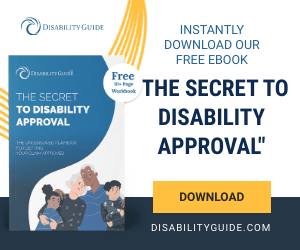Getting Approved
10 Benefits of Working With a Disability Attorney

Applying for Social Security Disability benefits can be confusing and overwhelming; even more so when you feel like you’re in it alone. Thankfully, there are resources you can turn to for help.
One of the best resources available to you is a free consultation with an experienced disability attorney. Disability attorneys are highly familiarized with the Social Security process, and can assist you through every step of its application and evaluation.
If you haven’t consulted with a disability attorney yet, here are 10 reasons you really should:
1. Your attorney doesn’t get paid unless you win benefits – It’s true. Your attorney will not get paid unless she helps you win benefits. You backpay will cover the contingency fee, and the Social Security Administration caps that pay at 25 percent or $6,000; whichever is less.
2. Your attorney will help you avoid common mistakes – Application mistakes are one of the biggest reasons claimants are initially denied benefits. An attorney will make sure all forms are filled out properly, and help correct any mistakes you may have previously made.
3. Your attorney will handle a majority of the paperwork for you – Many times you disability attorney will fill out appeals forms for you, and assist with filling out other various paperwork the Social Security Administration may need. It just leaves you with one less thing to do when you are dealing with a disabling condition.
4. Your attorney will stay in touch with the Social Security Administration about your case – It’s their job to follow up with the Social Security Administration on your behalf to ensure you have provided all the information they need to make an evaluation and keep up on deadlines.
5. Your attorney will stand by your side during an administrative law hearing – Your disability attorney will attend your hearing before an administrative law judge and help you present your case in the strongest light possible. He will also help you prepare beforehand so you understand what information the judge is looking for.
6. Your attorney may cut down the amount of time it take to win benefits – As mentioned above, a disability attorney will help you avoid common mistakes, and stay on top of deadlines, which could result in receiving an approval faster.
7. Your attorney will give you personalized advice – They know exactly what the Social Security Administration is looking for when it comes to evaluating your case. They will review your file and offer tips to strengthen your case based on your exact situation and medical condition.
8. Your attorney will help you meet Social Security deadlines – Working with a disability attorney means you never have to keep track of deadlines and worry about meeting them. Your attorney will keep track of all that on your behalf, and ensure your case moves along as quickly as possible.
9. Your attorney will coordinate with your doctor – Oftentimes, attorneys will ask your doctor to write a statement about your disability in regards to how it affects your day-to-day life and abilities to work. Additionally, your attorney may ask your doctor to perform other tests or document certain aspects of your condition if she feels the medical evidence in your case is a little thin.
10. Your attorney knows how to handle “bad facts”– It’s not uncommon for medical records to include information that could be harmful to your case. Attorneys refer to this evidence as “bad facts.” A disability attorney will be able to confront these facts head on, and explain them in a way that minimizes their effect on your case.
As you can see, an experienced Social Security Disability attorney can be an invaluable resource when it comes to applying for disability benefits. They really do have your best interests in mind, and will fight their hardest to make sure you get the benefits you deserve. Don’t wait until tomorrow, schedule a free consultation today.
Getting Approved
10 Ways to Keep Your Mind Sharp

It’s back-to-school season again. And even if you’re not heading to classes this fall, there are still lots of ways you can develop healthy habits that improve your thinking skills.
By finding simple brain training exercises to keep your mind sharp over the years, you’ll not only improve overall brain health, but also prevent cognitive impairment over time. To give you some ideas, here are 10 things that have been proven to improve brain function and cognitive skills.
1. Get plenty of sleep—Perhaps not the first tip you were expecting, but getting enough rest does an awful lot to keep your mind fresh and invigorated. Plus getting seven to nine hours of sleep consistency has been linked to improved brain function and a significant increase of memory functions. On the flipside, frequent sleep deprivation is also linked to cognitive decline in old age. The relationship may not be causal, but it’s definitely something to think about.
2. Journal by hand—Here’s an interesting fact: did you know that handwriting, the kind that involves a pen and paper and no technology whatsoever, has actually been shown to sharpen your mind? Studies have also found that when you take notes by hand, you are exponentially more likely to remember them afterwards. So if you want to give your mind a workout and remember something, write it down the traditional way.
3. Drink lots of water—Yes, yes, I know how tired you are of hearing this one, but staying hydrated really does improve every aspect of your health, including your long-term mental health. Water cleanses your body and your brain tissues, and it also helps boost your energy, increase alertness, and curb hunger too. A study published in 2006 actually discovered that people who stayed well hydrated and also consumed a healthy diet of fruit and vegetable juices had a decreased risk of developing Alzheimer’s disease.
4. Always continue learning—It stands to reason that the best way to keep your brain in tip top shape is to use it, especially for older adults. You don’t have to be in school to keep learning, so look around for opportunities to try new things. Attend a local seminar. Learn some new software at your local library. Take a meditation class at a community college. Reading new books and interesting articles online is my personal favorite way to keep learning, so do whatever you find most interesting.
5. Break your routine—This might be a hard one if you’re a just-so creature of habit like me. But learning a new skill or just altering your day-to-day routine is actually a great way to stimulate different parts of your brain and prevent both your life and your internal chemistry from going stagnant. I fully give you permission to break out of your shell and do something a little crazy that maybe you’ve never tried before.
6. Use all your senses—All five of your senses are linked to separate parts of your brain, so using all of them regularly is a great way to both stimulate your cognitive abilities and invigorate yourself. Looking at beautiful art, browsing a fancy candle store, trying exotic new foods, and attending a live concert are all great options. Plus unique sensory experiences also boost your memory. Did you know you’re much more likely to remember pictures and experiences when they’re paired with specific scents? Food for thought . . . or your nose I guess?
7. Get some regular exercise—Physical exercise is another great refresher for the brain and has actually been proven to reduce the risk of dementia. So get moving. Living a generally active lifestyle and getting at least 30 minutes of exercise every other day will do wonders for both your physical health and your mental health. Aerobic exercise is also a great break from technology and a good old-fashioned way of increasing blood flow and lowering your stress levels naturally.
8. Stimulate your brain—If you’ve heard any advice about keeping your mind sharp, it’s probably this one. A brain game is a fantastic way to challenge your brain cells and reduce your risk of age-related memory loss. So give some a try. Sudoku is my personal favorite, but crossword puzzles, Mah Jongg, and brainer teasers like these are great too. Remember the key is to introduce novelty to your brain, plus the feeling of accomplishment when you defeat a particularly tricky puzzle is well worth the effort all on its own.
9. Believe in your healthy brain—There are a lot of myths about memory loss wandering around out there, and it’s actually in your best interest not to believe what you hear. Studies have actually shown that people who feel stress about losing their memory or put too much stock into mental decline stereotypes are much more likely to experience mental decline and memory-loss difficulties. So give your brain power the benefit of the doubt.
10. Don’t be too hard on yourself—Along with believing in your brain, be kind to yourself and take it easy on your memory skills. Everyone has little slip ups and moments of forgetfulness, so don’t beat yourself up for being human. Feel free to invest in a good planner to help you remember things, and keep in mind that forgetfulness is sometimes a sign that you’re packing too much into your brain. So give yourself the freedom to forget the little things that really don’t matter all that much in the long run.
Want to read more healthy living tips? Try this one on seven ways to beat your stress or this one about all the virtues of drinking more water. Some of them might surprise you.
Getting Approved
Quick Tip: List Your Attorney as a Contact for the SSA

As you’re preparing your application for Social Security Disability, one of the best things you can do to help your case is to list your disability attorney. Every application has a section for relevant contacts that the SSA can ask about your case, and who better to have them call than the person who knows the most about getting you approved?
Keeping an open line of communication between the SSA and your disability attorney is arguably the number one thing that will get your application through on the very first try for all kinds of reasons:
1. Your disability attorney is intimately acquainted with your case. Because of this he or she will be able to answer the SSA’s questions in a way that will accurately and effectively represent you.
2. Your attorney knows the SSA lingo. While your close friends or your family doctor might know an awful lot about your condition, your attorney is the one who will know how to translate your case into terms that will make sense to the SSA—and increase your chances of approval.
3. They’ll know how to handle any obstacles that arise. If your attorney is in regular contact with the SSA, he or she will be right there to resolve objections and stop approval-killing obstacles before they become a reason for your application to be denied.
4. Your attorney knows what NOT to say. There are things that will improve your case and also things that will not improve your case. Since your disability attorney is familiar with the ins and outs of approval, they need to be right on the front lines to help you steer your application to success. Why else would you have hired them?
For even more fantastic benefits of working with a disability lawyer, check out this great blog post.
Getting Approved
Can Social Media Activity Affect My Disability Case?

In the age of social media, nothing is private anymore. Every day, millions of people from older adults to adolescents upload personal information about themselves and their social relationships. Most of the time, we do it without thinking about how their social media posts could be used by others.
If you are filing for Social Security Disability benefits, you should be highly aware of what you are posting on social media sites. Even things that may seem innocuous have the ability to affect a disability examiner or administrative law judge’s opinion about your disability claim and your status as a disabled person.
While the Social Security Administration has official rules prohibiting examiners and judges from searching the Internet for information about disability applicants, that doesn’t mean it never happens. It just means that social media activity cannot be cited as a primary reason for denial in a disability decision. Public information about you could still be found, and could color a case evaluator’s perception of your claim.
We’re not trying to scare you off Facebook and Twitter forever. Social networking and following the right influencers can be a beneficial source of social support within the disability community. We just want to you to be aware of what information is publicly visible on your social media accounts. As long as you’re being honest about your disability issues, mental health, physical activity, and functional limitation on your Social Security Disability application, you shouldn’t have any problems. But just in case, you may want to do an audit of your social disabled community to see what information about you is publicly available.
Delete anything you feel could affect your case for benefits. Even an innocent status update posted in jest such as “love all this free time I have waiting for disability benefits,” could raise some eyebrows by the Social Security employees evaluating your claim.
Once you’ve cleaned up your social media sites, consider making them private if you haven’t done so already. Not just because you are applying for disability benefits, but because it’s simply a good idea for your protection. You never know how people will use your information, and the last thing you want is for it to fall into nefarious hands.
Finally, as you move through the disability process, be mindful of what you are sharing and how a disability examiner or administrative law judge could react to it. While your profile may be set to private, there are other ways it could end up in front of public eyes.
In the end, your social media accounts probably won’t have much of an impact on your Social Security Disability case, but it’s better to be safe than sorry. If you have any concerns about your claim for disability benefits, including whether your social media activity could be hurting your case, you should consult with an experienced Social Security disability attorney.
Curious on what other behaviors might have a negative impact on your Social Security Disability claim? You’ll definitely want to read our article with “10 Things You Shouldn’t Do When Filing for Social Security Disability.”
-

 About SSI & SSDI9 years ago
About SSI & SSDI9 years ago6 Different Types of Service Animals
-

 Getting Approved10 years ago
Getting Approved10 years agoWill Medical Marijuana Affect My Social Security Disability Case?
-

 About SSI & SSDI10 years ago
About SSI & SSDI10 years agoHow the Social Security Blue Book of Impairments Can Affect Your Disability Claim
-

 About SSI & SSDI9 years ago
About SSI & SSDI9 years agoSSDI or SSI: What Makes These Programs Different?
-

 Getting Approved10 years ago
Getting Approved10 years ago9 Useful Secrets For Filling Out The Social Security Disability Application
-

 Getting Approved10 years ago
Getting Approved10 years agoQuick Tip: List Your Attorney as a Contact for the SSA
-

 About SSI & SSDI10 years ago
About SSI & SSDI10 years ago9 Common Reasons Social Security Disability Claims Are Denied
-

 Getting Approved10 years ago
Getting Approved10 years agoCan Social Media Activity Affect My Disability Case?


